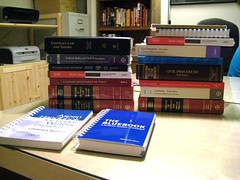My friend RJ knows that I was one of the least stressed people during finals week during law school. She asked me to share my wisdom with all of you. So here are my top 10 tips for surviving law school finals.
-

Law School Textbooks (Photo credit: Jesse Michael Nix) Identify your Goals. You may have been at the top of your class in high school and undergrad, but in law school, you are surrounded by severely smart people and only one of you can set the curve. I went to law school to learn the law so my goal for every final was just to pass. For most people, that goal is enough, unless you want a judicial clerkship or a job at a super prestigious law firm that will only talk to you if you’re in the top 10% of the class.
- Study When you Can. There will be times when you can’t focus to save your life and you’d rather clean your house than read your outline. When those times hit, put down your notes and pick up a broom. Studying is about quality, not quantity. If you’re not being productive, take a break.
- Study Where you Can. Some people can only study in the library. Some people have to be anywhere but the library. Being in the law school tended to make me really anxious, so I avoided it like the plague during finals.
- Use Study Techniques that Work for You. Don’t feel the need to have big beautiful 100-page outline if something else works better for you, like flash cards.
- Don’t Bother Studying Right After a Final. Your brain will be toast. Go get something to eat and get a good night’s sleep before your next study session.
- Get to the Test Room Early and Set Up Camp. I didn’t like people too close to me during exams so I’d get to exams early and set up camp. I always had water, soda, apple slices, Jolly Ranchers, a sweatshirt, pens, pencils, my computer, and my notes. I’d spread my stuff out and put my bag on the chair next to me so no one could sit next to me.
- Make the Instructor Laugh. You will get more points if you entertain the person who is grading your test. My professor for civil procedure called parties in the cases we read “morons†so I looked for an opportunity to call someone a moron on my final. My trademark law professor had a tendency to swear in class so when he asked what I’d tell the client in the hypo on the final, I wrote, “I’d say, ‘You’ve got to be fucking kidding me if you think you have a case.’â€
- Don’t Talk About the Test After the Test. Once you turn in your test and walk out of the room, don’t think or talk about the test. There’s nothing you can do at that point to change the outcome. I used to yell at people who talked about the test after the test.
- Don’t Panic. I wrote about the seven layers of academic hell during law school. The seventh layer is “Fuck It.†You want to get to that level as soon as possible. No matter what, stay calm while you’re studying or taking a test.
- Don’t Check Your Grades. After my first semester of law school, I never checked my grades. At the end of each semester I sent the assistant dean of my law school an email to make sure I passed. Since my goal was to pass, I never needed to know what my grades, GPA, or class rank were – and I was a happier person for it.
Good luck to everyone taking finals. Kick some ass!
Related articles
- 3 Pointers For Success in Law School (usnews.com)
- How to get ahead of your classmates at Law School (gemmajallen.wordpress.com)
- 5 Funny But True Tips On How To Become A Lawyer (hellobeautiful.com)



